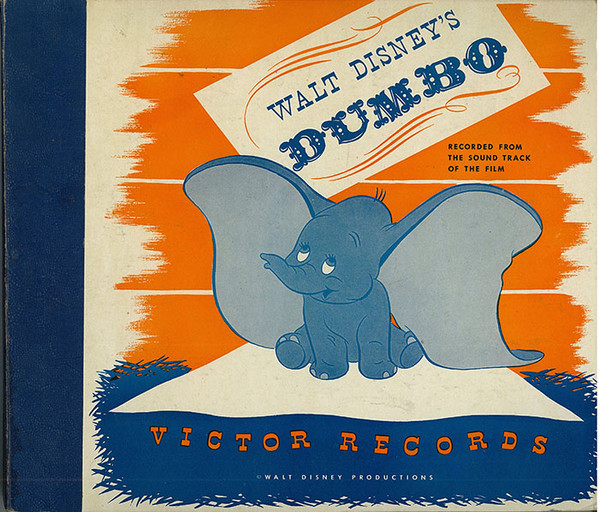
A few months after The Reluctant Dragon, Walt Disney’s studio released Dumbo. Audiences thought this was more like it: No artsy-craftsy stuff set to classical music.
No cobbling together of disparate elements, some of which were in black-and-white. Just a good cartoon story, done up in Technicolor, with the usual mix of comedy, “heart” and several singable songs.
 The promoters at the music department of the Walt Disney studios were, however, finding that things had changed in just a few short years. It was no longer a “given” that most of the songs from a Disney animated feature would get covered by various bands and/or singers.
The promoters at the music department of the Walt Disney studios were, however, finding that things had changed in just a few short years. It was no longer a “given” that most of the songs from a Disney animated feature would get covered by various bands and/or singers.
With that in mind, the promoters decided to concentrate on two of the songs from the score: the lullaby “Baby Mine” and the rhythmic novelty “When I See An Elephant Fly”.
Victor, often seen as the industry leader, did not assign either of these songs to one of its orchestras–not to Sammy Kaye, nor to Art Jarrettf, nor to Artie Shaw. Victor did, however, put out another “album” of dubbings from the sound track of “Dumbo”. This album (set P-101, consisting of records 27620 through 27622) was another “book of three”, and featured any piece of music that mattered.
This album was ostensibly issued in Great Britain on His Master’s Voice. But a label that shows up in a great lot of images shows UK matrix numbers, making this one wonder if new dubbings were made in London from the sound track. These records bear the yellow label that was used a few years earlier for the dubbings of “Silly Symphonies” cartoons.
Victor’s low-priced Bluebird label had more faith in the numbers, giving them to the top band on the label—and in the country. Glenn Miller got to cut both “Baby Mine” and “Elephant”, and the record probably sold well.
Bluebird also issued a “vocadance” (a vocal record done in dance tempo) of “When I See An Elephant Fly”. This was by the Four King Sisters, with the backing of a group led by Alvino Rey (the former Al McBurney), a pioneer in the use of the electric steel guitar–and husband to one of the Sisters.
Over at Columbia, again, none of their big bands got to record either of these songs. But they were not ignored entirely. Vocal versions were cut by Jane Froman, a singer who was making her name on the radio. Froman’s life would have some severe ups and downs–and she’d be the subject of one of those weepy Hollywood biopics in the early 1950’s, when she was making a “comeback” on television.
The low-priced OKeh label did get into “Baby Mine”, assigning it to a band that had not yet reached its peak–Les Brown and his Orchestra. Curiously, they didn’t pick the swinging “Elephant”, which might have been more suited to its style.
Decca, king of the thirty-five cent record, covered both songs–but with a band that was well-down on the pecking order. Johnny Messner had a versatile, rather smallish band, which had recorded previously for Bluebird and for Eli Oberstein’s Varsity label. For the latter marque, they had succeeded with a risque’ novelty, “She Had To Go And Lose It At The Astor”. Their biggest asset, other than this, was the presence of one Paul Kulithaw, who worked as “Professor Coleslaw”, playing a child’s toy piano.
Dumbo made a profit on its initial theatrical release–a feat not accomplished since Snow White. Despite this, over the years, it has been treated in a less-than-golden manner by the Disney studio. This was one of the first Disney features to get television airing on “Disneyland” in the middle 1950’s. And it was one of the first to get released on those newfangled videocassettes in the late 1970’s.
And after all those years, however, it still holds up well as perfect entertainment – and one of Disney’s greatest films.


 James Parten has overcome a congenital visual disability to be acknowledged as an expert on the early history of recorded sound. He has a Broadcasting Certificate (Radio Option) from Los Angeles Valley College, class of 1999. He has also been a fan of animated cartoons since childhood.
James Parten has overcome a congenital visual disability to be acknowledged as an expert on the early history of recorded sound. He has a Broadcasting Certificate (Radio Option) from Los Angeles Valley College, class of 1999. He has also been a fan of animated cartoons since childhood.












































Bea Wain had “Baby Mine” on Victor 27736.
Claude Thornhill and His Orchestra had “Baby Mine” on Columbia 36413, with vocal by Lillian Lane.
Thank you for the corrections/additional information to this post.
Wow. Did not know Dumbo was first televised that far back. Love Dumbo. A perfect straightforward story.
Glenn Miller recorded BABY MINE but did NOT record ELEPHANT. Charlie Spivak did record ELEPHANT on Okeh.